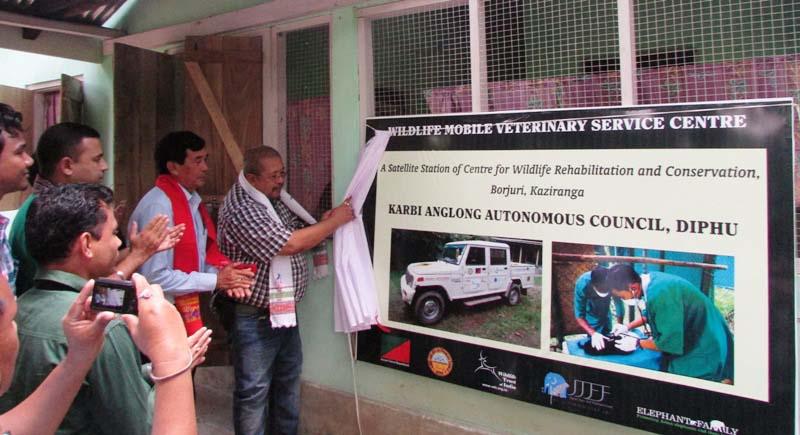Karbi Anglong Autonomous Council (KAAC) authority formally handed over the newly built MVS Field Station to Wildlife Trust of India (WTI) at a function in Diphu, the district head quarter of Karbi Anglong, Assam today.
Pradip Signar, the honourable Executive Member (Forest) of Karbi Anglong Autonomous Council (KAAC) handed over the facility in presence of Dr. Abhijit Rabha, Additional PCCF of Karbi Anglong Forest Department. Signar wished that the rescue and rehabilitation center will bear fruit in building the bridge between people and wildlife in the hill district of Assam.
While welcoming the august gathering at the inauguration of the MVS field station, Dr Abhijit Rabha, Additional PCCF –Karbi Anglong told that the partnership of KAAC and WTI has been historic so far and has resulted in many conservation milestones for Karbi Anglong hills.
The handing over ceremony was organized jointly by Karbi Anglong Forest Department, KAAC and WTI at 8 kilo, on Diphu- Lumding road near Morat Longri Wildlife Sanctuary.
Senior officials of both forest and civil authorities of the council were present at the function. Divisional Forest Officers of West Karbi Anglong Division and Working Plan Division along with Village Headmen, frontline staff and local people of the area attended the event.
Dr. Bhaskar Choudhury, Regional Head & Head Vet, Dr. Daoharu Baro, veterinarian, oDilip Deori, Manager, Yuri Pator, Bosrsali Teron and Amitabha Choudhury, officials of WTI represented the organisation at the event.
Commissioned in 2005, the jointly run MVS Satellite facility of Karbi Anglong has been operated from Diphu from a temporary shelter as a joint project of KAAC, Karbi Anglong Forest Department and WTI. Now it has got a permanent office. This unit was started at a temporary shelter area for holding small animals and birds provided by the forest department. In the last ten years of its operation, this facility has handled around 300 rescue cases and 41.32 % of animals were release back to the wild. The prime wildlife cases attended by the Karbi Anglong MVS team are Asian Elephant, Clouded Leopard, Eastern Hoolock Gibbon, slow Loris which are mostly the endangered species of the landscape.




Add new comment